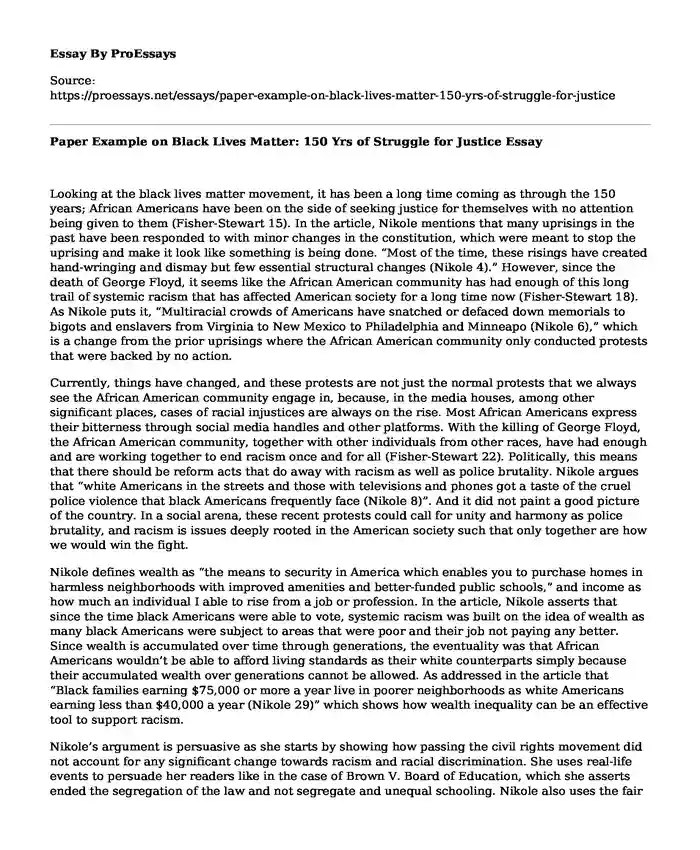Looking at the black lives matter movement, it has been a long time coming as through the 150 years; African Americans have been on the side of seeking justice for themselves with no attention being given to them (Fisher-Stewart 15). In the article, Nikole mentions that many uprisings in the past have been responded to with minor changes in the constitution, which were meant to stop the uprising and make it look like something is being done. “Most of the time, these risings have created hand-wringing and dismay but few essential structural changes (Nikole 4).” However, since the death of George Floyd, it seems like the African American community has had enough of this long trail of systemic racism that has affected American society for a long time now (Fisher-Stewart 18). As Nikole puts it, “Multiracial crowds of Americans have snatched or defaced down memorials to bigots and enslavers from Virginia to New Mexico to Philadelphia and Minneapo (Nikole 6),” which is a change from the prior uprisings where the African American community only conducted protests that were backed by no action.
Currently, things have changed, and these protests are not just the normal protests that we always see the African American community engage in, because, in the media houses, among other significant places, cases of racial injustices are always on the rise. Most African Americans express their bitterness through social media handles and other platforms. With the killing of George Floyd, the African American community, together with other individuals from other races, have had enough and are working together to end racism once and for all (Fisher-Stewart 22). Politically, this means that there should be reform acts that do away with racism as well as police brutality. Nikole argues that “white Americans in the streets and those with televisions and phones got a taste of the cruel police violence that black Americans frequently face (Nikole 8)”. And it did not paint a good picture of the country. In a social arena, these recent protests could call for unity and harmony as police brutality, and racism is issues deeply rooted in the American society such that only together are how we would win the fight.
Nikole defines wealth as “the means to security in America which enables you to purchase homes in harmless neighborhoods with improved amenities and better-funded public schools,” and income as how much an individual I able to rise from a job or profession. In the article, Nikole asserts that since the time black Americans were able to vote, systemic racism was built on the idea of wealth as many black Americans were subject to areas that were poor and their job not paying any better. Since wealth is accumulated over time through generations, the eventuality was that African Americans wouldn’t be able to afford living standards as their white counterparts simply because their accumulated wealth over generations cannot be allowed. As addressed in the article that “Black families earning $75,000 or more a year live in poorer neighborhoods as white Americans earning less than $40,000 a year (Nikole 29)” which shows how wealth inequality can be an effective tool to support racism.
Nikole’s argument is persuasive as she starts by showing how passing the civil rights movement did not account for any significant change towards racism and racial discrimination. She uses real-life events to persuade her readers like in the case of Brown V. Board of Education, which she asserts ended the segregation of the law and not segregate and unequal schooling. Nikole also uses the fair Housing act as another example of her unending law reforms that change nothing towards the post-independence struggle for freeing of black people as the act only “forbidden discrimination in accommodations, but it did not reorganize real estate values (Nikole 24).” In an effort to “reinstate what was lost,” Nikole addresses explicitly the issue of racial wealth inequality, which is the only thing that could bridge the racial gap. She postulates that the wealth gap between white Americans and black Americans has been constant from 70 years ago, which is the underlying problem as even with black Americans attaining the same level of education as white Americans, they are still more likely to be unemployed compared to the whites. Several studies have attested to this phenomenon and hence making it clear that wealth inequality is the major reason why most black Americans suffer more and are subject to racial discrimination.
Works Cited
Fisher-Stewart, Gayle. Preaching Black Lives Matter. Church Publishing, 2020.
Nikole Hannah-Jones. “What is Owed.” Published in New York
Cite this page
Paper Example on Black Lives Matter: 150 Yrs of Struggle for Justice. (2023, Sep 23). Retrieved from https://proessays.net/essays/paper-example-on-black-lives-matter-150-yrs-of-struggle-for-justice
If you are the original author of this essay and no longer wish to have it published on the ProEssays website, please click below to request its removal:
- Essay Sample on Jeffrey Dahmer Case
- Differences in Home Food and Activity Environments Between Obese and Healthy Weight Families of Preschool Children
- Food Additives and Health Concerns in America Essay
- Critical Analysis Of Essay: Distribution of Resources and Poverty Universal Basic Income
- Case Study on Ronald Jeffery Prible
- Crime Prevention Research Proposal
- Essay Sample on Courteous Civility in Society: Exploring Kindness & Incivility







